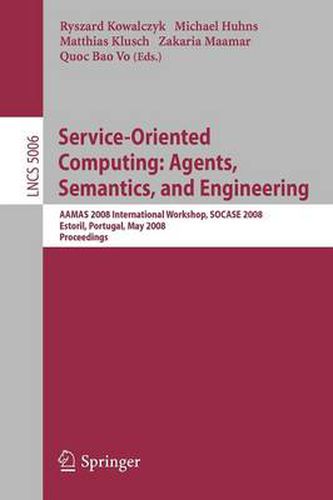Readings Newsletter
Become a Readings Member to make your shopping experience even easier.
Sign in or sign up for free!
You’re not far away from qualifying for FREE standard shipping within Australia
You’ve qualified for FREE standard shipping within Australia
The cart is loading…






This title is printed to order. This book may have been self-published. If so, we cannot guarantee the quality of the content. In the main most books will have gone through the editing process however some may not. We therefore suggest that you be aware of this before ordering this book. If in doubt check either the author or publisher’s details as we are unable to accept any returns unless they are faulty. Please contact us if you have any questions.
The globaltrendtowardsmore?exible anddynamic businessprocessintegration and automation has led to a convergence of interests between service-oriented computing, semantic technology, and intelligent multiagent systems. In parti- lar the areas of service-oriented computing and semantic technology o?er much interestto the multiagentsystemcommunity,including similaritiesin system- chitectures and provision processes, powerful tools, and the focus on issues such as quality of service, security, and reliability. Similarly, techniques developed in themultiagentsystemsandsemantictechnologypromisetohaveastrongimpact on the fast-growing service-oriented computing technology. Service-oriented computing has emerged as an established paradigm for d- tributed computing and e-business processing. It utilizes services as fundam- tal building blocks to enable the development of agile networks of collaborating business applications distributed within and across organizational boundaries. Services are self-contained, platform-independent software components that can be described, published, discovered, orchestrated, and deployed for the purpose of developing distributed applications across large heterogeneous networks such as the Internet. Multiagent systems are also aimed at the development of distributed - plications, however, from a di?erent but complementary perspective. Servi- oriented paradigmsaremainly focused on syntacticaland declarativede?nitions of software components, their interfaces, communication channels, and ca- bilities with the aim of creating interoperable and reliable infrastructures. In contrast, multiagent systems center on the development of reasoning and pl- ning capabilities of autonomous problem solvers that apply behavioral concepts such as interaction, collaboration, or negotiation in order to create ?exible and fault-tolerant distributed systems for dynamic and uncertain environments.
$9.00 standard shipping within Australia
FREE standard shipping within Australia for orders over $100.00
Express & International shipping calculated at checkout
This title is printed to order. This book may have been self-published. If so, we cannot guarantee the quality of the content. In the main most books will have gone through the editing process however some may not. We therefore suggest that you be aware of this before ordering this book. If in doubt check either the author or publisher’s details as we are unable to accept any returns unless they are faulty. Please contact us if you have any questions.
The globaltrendtowardsmore?exible anddynamic businessprocessintegration and automation has led to a convergence of interests between service-oriented computing, semantic technology, and intelligent multiagent systems. In parti- lar the areas of service-oriented computing and semantic technology o?er much interestto the multiagentsystemcommunity,including similaritiesin system- chitectures and provision processes, powerful tools, and the focus on issues such as quality of service, security, and reliability. Similarly, techniques developed in themultiagentsystemsandsemantictechnologypromisetohaveastrongimpact on the fast-growing service-oriented computing technology. Service-oriented computing has emerged as an established paradigm for d- tributed computing and e-business processing. It utilizes services as fundam- tal building blocks to enable the development of agile networks of collaborating business applications distributed within and across organizational boundaries. Services are self-contained, platform-independent software components that can be described, published, discovered, orchestrated, and deployed for the purpose of developing distributed applications across large heterogeneous networks such as the Internet. Multiagent systems are also aimed at the development of distributed - plications, however, from a di?erent but complementary perspective. Servi- oriented paradigmsaremainly focused on syntacticaland declarativede?nitions of software components, their interfaces, communication channels, and ca- bilities with the aim of creating interoperable and reliable infrastructures. In contrast, multiagent systems center on the development of reasoning and pl- ning capabilities of autonomous problem solvers that apply behavioral concepts such as interaction, collaboration, or negotiation in order to create ?exible and fault-tolerant distributed systems for dynamic and uncertain environments.